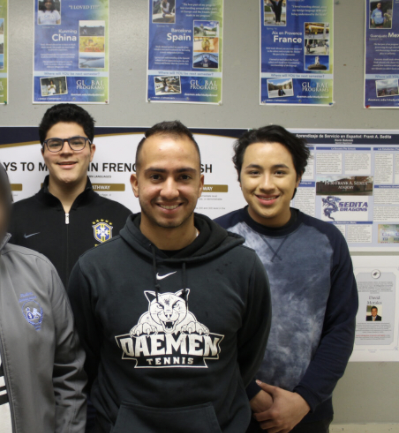Melissa Fiori, an associate professor in the Modern Languages Department at Daemen University, published an article last month on the institution’s unique Language Assistant Program in FLTMAG – a peer-reviewed journal by the International Association for Language Learning Technology (IALLT).
The article, “Language Assistant Visit Program: Interpersonal, Intercultural, Community-Building Virtual Activities” explains the design of the program, its benefits for students and their education, and how it can serve as a guide to other higher education institutions.
Language Assistant Program
Founded in 2009, the program hires eligible work-study students who are fluent in French or Spanish to help other Daemen students learn one or both of the languages.
“At the heart of the program is collaboration between instructors and students, and peers with peers,” Fiori wrote, in the article. “Students come together to learn language in a way that cultivates intercultural competence, exercises interpersonal communication skills, and builds community.”
Students who are native and heritage-speaking – meaning they learned the language in an informal setting – are recruited through Daemen’s Athletics Department, Global Programs Office, Student Success Center or by recommendation.
Candidates are given insight into the program requirements and undergo interviews to verify their level of oral fluency before entering their work-study positions, Fiori said.
Interpersonal benefits
The program also helps celebrate what heritage- and native-speakers bring to campus.
“We’re integrating and celebrating their skill set, while at the same time helping our language learners connect with the internal community at Daemen,” said Fiori.

She added, “Most other institutions of higher learning hire contractors for this type of service and it’s not as personal as our program. We’re connecting international students with domestic students, thereby creating a community of language speakers.”
Preparing students for employment
The program has proven to be attractive to both domestic and international students who are pursuing a variety of majors and career paths.
“Being multilingual has grown in importance to employers,” said Fiori. “The Language Assistant Program helps students develop skills necessary to pass proficiency exams that future employers want them to take.”
She added, “A business can train you in many skill sets; however, they can’t train you in language overnight.”
Assistance for many majors
Daemen also offers a Spanish for Health Professions minor for students studying to work in healthcare.
“Students in Daemen’s nursing, physician assistant studies and physical therapy programs recognize the need for bilingual abilities in healthcare,” said Fiori. “They work with language assistants taking 100, 200, 300 level classes.”
Daemen also integrates language proficiency into the requirements for bachelor of arts programs at the university to prepare graduates for a workforce where the demand for bilingual workers is steadily increasing.
“With this requirement comes the responsibility to build the skills that employers seek: bilingualism, technological literacy, and intercultural competence,” Fiori wrote in the paper. “The Language Assistant Program at Daemen [University] plays a key role in helping graduates develop these skills through their language requirement.”


